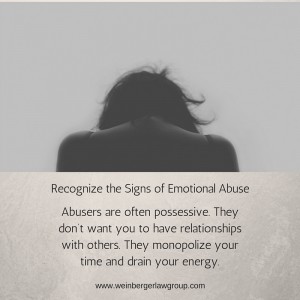Recognizing The Signs of Intimate Partner Violence
 Although we like to think we live in a more enlightened age, unfortunately, when it comes to intimate partner violence, also known as domestic violence, we, as a society, still have a long way to go. According to the Association of American Family Physicians, in the United States, approximately 1.5 million women and 834,700 men annually are raped and/or physically assaulted by an intimate partner. Women are more likely than men to be injured, sexually assaulted, or murdered by an intimate partner. Studies suggest that one in four women is at lifetime risk.
Although we like to think we live in a more enlightened age, unfortunately, when it comes to intimate partner violence, also known as domestic violence, we, as a society, still have a long way to go. According to the Association of American Family Physicians, in the United States, approximately 1.5 million women and 834,700 men annually are raped and/or physically assaulted by an intimate partner. Women are more likely than men to be injured, sexually assaulted, or murdered by an intimate partner. Studies suggest that one in four women is at lifetime risk.
To remedy these tragic statistics, education is key, as is awareness of the many faces of intimate partner violence. Not all forms are intimate partner violence (IPV) are easy to recognize because IPV is not always physical violence; IPV can also be threats, intimidation or harassment, and more.
How do you know if you are in a abusive relationship? The most telling sign of abuse is fear of your partner. If you are constantly feeling like you have to watch what you say around your partner, or if you are afraid of their reactions to you, chances are you are in an unhealthy or abusive relationship. Other signs of an abusive relationship are if your partner is belittling or trying to control you, or if you are feeling worthless, helpless or desperate. Ask yourself the following:
Does your partner…
- act excessively jealous and possessive?
- control where you go or what you do?
- keep you from seeing your friends or family?
- limit your access to money, the phone, or the car?
- constantly check up on you?
Do you…
- feel afraid of your partner much of the time?
- avoid certain topics out of fear of angering your partner?
- believe that you deserve to be hurt or mistreated?
- wonder if you’re the one who is crazy?
- feel emotionally numb or helpless?
Abuse can be emotional, physical or sexual. It’s still abuse even if there has never been physical violence and even if the incidents of abuse seem minor to you. In fact, some abusers attempt to control their partners financially, so that their partners have fewer resources to get help or to leave the relationship. Domestic violence or intimate partner violence is about control, and abusers will try to intimidate and isolate their partners from friends and family.
Your abuser’s apologies and loving gestures in between the episodes of abuse can make it difficult to leave. He may make you believe that you are the only person who can help him, that things will be different this time, and that he truly loves you. However, the dangers of staying are very real.
For assistance locating safe house shelters and other resources, call the National Domestic Violence Hotline at 1-800-799-7233 (SAFE) or the NJ Domestic Violence Hotline: 1-800-572-SAFE (7233). In am emergency, please call 911.
If you or a loved one is being threatened or intimidated by someone, or if your family is being threatened or coerced, get the help you deserve, including filing for a temporary restraining order. Our attorneys are ready to assist you with any domestic violence or other family law issue that you may be experiencing. Please contact us today to set up your initial and confidential consultation.


